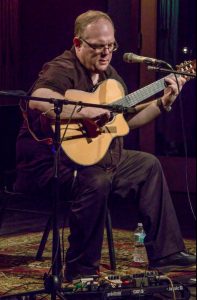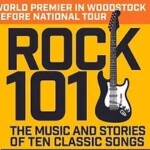
There was music, mirth and more at the Heartwood Soundstage, here in north central Florida when master guitarist Richard Smith visited the venue for his first time. He immediately set the audience to smiling and foot tapping with a couple of Jerry Reed “finger busters” starting with “East Wind,” and then proceeded to blow folks away for two hours (with a short break) and plow a wide swath through musical history and geography while doing so.
Ever since 1982 when Chet Atkins brought the then 11-year-old Brit onto a London stage, there’s been no stopping his growth as an artist. Totally capable of sustaining a full concert by himself, Smith has also shared stages with Les Paul, Joe Pass, Eric Clapton, Albert Lee, Mark O’Connor, Steve Morse and dozens more high-caliber artists. For the last 20 years he has resided in the Nashville area and obviously delights in his calling by touring both the States and Europe. He places no boundaries on his finger-style guitar and gave the audience a healthy taste, performing many well-known favorites in ragtime, jazz, stride, classical, bluegrass, blues,Travis picking and more. His performance of “Georgia,” with just six strings and ten fingers, packs all the power, soul and nuance that Ray Charles put into it with 88 keys and Ray Charles. When Smith (rarely) does sing one, he chooses wisely, tastefully and at times incredibly hilariously, as he did by reproducing his uncle’s very worn out, skipping record of “Tennessee Waltz,” the tune that introduced him to country music.
He marched us out with a jaw dropping show stopper, from John Phillips Sousa, “Stars and Stripes Forever,” originally arranged for guitar by Guy Van Duser. It’s not a big deal for a 40 piece marching band, but to cover all the parts Sousa wrote from tubas to piccolos with just six strings takes more than a bit of practice.
Called back for an encore, he settled the herd down with a delightful reading of the standard “If I Had You,” complete with vocal, a somewhat ironic choice, since I believe he “had” everyone by the first few bars of his opener.
—Ken Spooner







Be the first to comment!